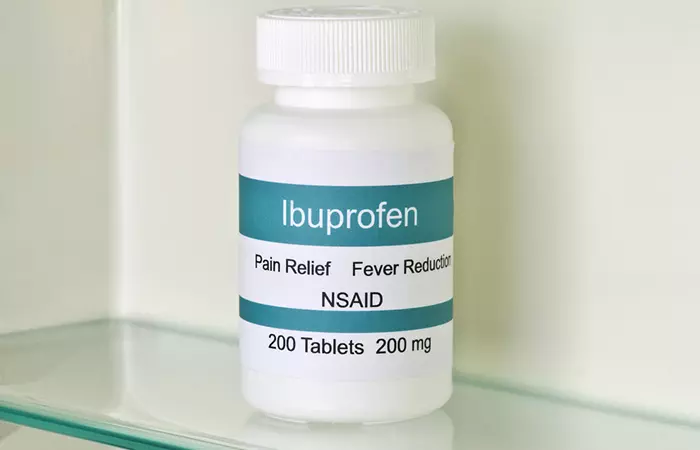Ibuprofen Before Getting A Tattoo – What You Should Know
Find out if you can take this painkiller before getting inked to make your experience fuss-free.

Image: Shutterstock
If you feel jittery before getting a tattoo, know that it is completely normal considering the pain that comes with the process. It is natural for one to want to pop a painkiller such as Ibuprofen to manage the anticipated discomfort of the tattooing process. But can you take Ibuprofen before a tattoo? Ibuprofen is an FDA-approved medication that is commonly used as an over-the-counter pain reliever and fever reducer. It is also used to treat conditions such as inflammatory diseases, dysmenorrheai A medical term for painful cramps experienced by some women during menstruation that can range from mild to severe. , and osteoarthritisi A disease characterized by the breakdown of the tissue in joints that leads to pain, stiffness, and reduced joint mobility. (1). Even though it is an FDA-approved pain reliever, most healthcare experts do not recommend taking Ibuprofen for tattoo pain. Let us find out why in the following sections.

In This Article
Can You Take Ibuprofen Before Getting A Tattoo?

If you are considering taking Ibuprofen before a tattoo because you think it helps dull the sting of the needle, the short answer is that it is not a good idea. Non-steroidal anti-inflammatory drugsi A class of medications that provide pain relief, reduce fever, prevent blood clots, and decrease inflammation. (NSAIDs) such as Ibuprofen are blood thinners. They affect the way the blood clots and prolong bleeding time, which makes them risky to take before getting a tattoo as normal blood clotting is essential while tattooing (2). An animal-based study found that Ibuprofen significantly inhibits platelet aggregation (the process of plateletsi Small cell fragments in the blood that reach the injured site and stick to each other to form clots and prevent excessive bleeding. sticking together to form a clot) at all doses tested (3).
Ibuprofen affects the process of blood clotting, but what are the specific reasons because of which it may pose a threat during tattooing? Scroll down to the next section to take a look at some of the problems that may stem from this.
Key Takeaways
- It is recommended to avoid taking Ibuprofen before a tattoo as this blood-thinning medication delays blood clotting and prolongs bleeding time.
- The excessive bleeding disrupts the tattoo artist’s view of the tattoo stencil, complicating the entire procedure during your session.
- Taking Ibuprofen for fresh tattoo swelling is also not recommended as it may also slow down the healing process.
Why Is It Bad To Take Ibuprofen Before A Tattoo Session?
Taking Ibuprofen before a tattoo session is generally discouraged, as it delays blood clot formation. This may lead to severe bleeding, weakness, and bad tattoo outcomes, and may affect the wound-healing process. However, you may consider taking Tylenol before a tattoo, as it is not a blood thinner. Let us look at the downside of taking Ibuprofen before a tattoo session in detail below.
1. May Cause Excessive Bleeding
Ibuprofen slows down blood clotting time, which may lead to excessive bleeding. During the tattooing process, the needle pierces the middle layer of your skin, the dermis, which contains tiny blood vessels called capillaries. Due to this, it is normal for you to bleed a bit during the session. Usually, it takes 2 to 7 minutes for your platelets to form a clot (4). However, when you take non-steroidal anti-inflammatory drugs, they prevent this early clot formation and prolong the bleeding time (2). Excessive bleeding can make it harder for the tattoo artist to see their work clearly, which may affect the tattoo’s quality. The extra bleeding can also dilute the ink, leading to a less vibrant design that might fade quicker and need more frequent touch-ups later.
2. May Create Logistical Problems
During the tattooing process, a tattoo artist needs to have a clear view of the stencil that they are tracing. However, excessive bleeding due to taking painkillers such as Ibuprofen may obstruct their view and make it challenging to accurately etch the tattoo ink in the intended location. A restricted tattooist’s view may also result in an untoward tattoo design. They may have to constantly wipe the pool of blood every time they use the tattooing machine on the skin, which may also extend the time needed to finish the tattoo. Since most professional tattoo artists typically charge on an hourly basis, this may also affect the overall cost of your tattoo. Most professionals refuse to do a tattoo in such a case.
3. May Cause Weakness

When you are on Ibuprofen, you will be bleeding a lot more. This excess blood loss from the body may commonly be accompanied by symptoms such as dizziness, weakness, discomfort, nausea, and even fainting (5). This may become a significant obstacle, potentially making it nearly impossible for you to endure and continue with the tattoo process.
4. May Prolong The Healing Period
Research suggests that the usage of NSAIDs such as ibuprofen may impact healing negatively (6). Research has also shown how ibuprofen affects wound healing in animals. It found that the intake of this medication led to a decrease in fibroblastsi Type of cells that contribute to the formation of structural proteins like collagen that play a role in wound and tissue repair. (the most common cell of a connective tissue in an animal), which slows down the natural shrinking process of the wound and delays the formation of the outer layer of skin over it (6). This means that ibuprofen consumption before getting a tattoo may also slow down its healing process.
 Did You Know?
Did You Know?It is clearly not a good idea to take Ibuprofen before getting a tattoo. But can you take it after getting one? And if so, how long after getting one? Let us find out in the next section.
How Long After A Tattoo Can You Take Ibuprofen?

It is generally recommended to avoid taking ibuprofen for the first 48 hours after getting a tattoo. This may be because pain relievers such as Ibuprofen act as blood thinners and slow down the clotting time and wound healing process (6). Instead of opting for these medications, follow the aftercare instructions provided by your tattoo artist during the initial stages of healing to prevent infections. The aftercare usually includes keeping your fresh tattoo clean, moisturizing it, and avoiding submerging it in water and wearing tight clothing. If you experience pain or discomfort such as inflammation after this period, consult with your tattoo artist or a healthcare professional before taking any medication, including Ibuprofen.
Taking Ibuprofen before getting a tattoo is not recommended for pain management. But does taking it help with tattoo pain at all? The next section addresses this question.
Does Ibuprofen Help With Tattoo Pain?

Since over-the-counter pain relievers such as Ibuprofen are used for general pain management, you may feel that they help with tattoo pain. While Ibuprofen is also not ideal for tattoo pain management due to the reasons mentioned earlier, research suggests that if you experience swelling after your tattoo is completed, Ibuprofen may be beneficial in providing relief as it has anti-inflammatory properties (1). However, since it slows down the healing process, it is best you talk to your healthcare expert before taking it (6). Alternatively, you can also use topical numbing creams to manage tattoo pain during the actual procedure. You apply them on the skin before tattooing to help minimize pain and discomfort. You may consult your tattoo artist to recommend a suitable cream for you.
 Quick Tip
Quick TipAn oft-suggested alternative to Ibuprofen is to take Tylenol for inflammation and soreness after getting a new tattoo. The next section provides a comparison of the two.
Tylenol Or Ibuprofen After Tattoo: Which Is Better?

Both Tylenol (acetaminophen) and Ibuprofen are over-the-counter medications. Tylenol is generally considered a pain reliever and fever reducer. However, it does not have anti-inflammatory properties (7). So, it may be less effective for reducing swelling if you experience any after the initial tattoo healing process. Ibuprofen, on the other hand, can help reduce both pain and inflammation (1). But, as discussed earlier, it slows down the healing process of the tattoo (6). Due to this, there are mixed views about the use of both these drugs. Whether you want to take Tylenol or Ibuprofen before or after a tattoo session, it is best to consult with a professional tattoo artist or visit a healthcare professional for personalized advice.
All in all, the answer to “Can you take Ibuprofen before a tattoo?” is that you should avoid it. The medication may do more harm than good during your tattooing session as it increases the blood clotting time, which leads to excessive bleeding. It may also add to the tattooing time and cost and prolong the healing period. Further, it is recommended to avoid taking it just after the process as well. If you wish to take it after the initial healing of the tattoo for swelling, consult with your healthcare expert before doing so.
Frequently Asked Questions
What medication should you take before getting a tattoo?
Avoid taking any medications before getting a tattoo. If you take any prescription medicines such as those for diabetes or blood pressure, consult with your healthcare provider or tattoo artist for personalized advice based on your medical history. If you want medication for pain relief during the entire tattooing process, your artist may recommend using tattoo numbing creams that are applied directly to the skin.
Can you take Aspirin or Ibuprofen before a tattoo?
No, just like Ibuprofen, it is not recommended to take Aspirin before a tattoo as it is a blood thinning medication that may increase bleeding risk during the process (2). This, in turn, may make you feel weak and uncomfortable.
How long does Ibuprofen stay in your system?
Ibuprofen has a half-life of 1.8 to 2 hours. This means that your body takes almost two hours to eliminate half of this drug from it. However, it may take nearly 24 hours for the complete dose to move out of your system after the last one (8).
Still wondering if it is a good idea to take an Ibuprofen before getting inked? This video talks about dealing with tattoo pain. Check it out to figure out if this blood-thinning medication is the right choice for it!
References
Articles on StyleCraze are backed by verified information from peer-reviewed and academic research papers, reputed organizations, research institutions, and medical associations to ensure accuracy and relevance. Read our editorial policy to learn more.
- Ibuprofen
https://www.ncbi.nlm.nih.gov/books/NBK542299/ - Effects of nonsteroidal antiinflammatory drugs on platelet function and systemic hemostasis
https://pubmed.ncbi.nlm.nih.gov/7608308/ - Effect of Ibuprofen dose on platelet aggregation and coagulation in blood samples from pigs
https://pubmed.ncbi.nlm.nih.gov/25747637/ - Biochemistry clotting factors
https://www.ncbi.nlm.nih.gov/books/NBK507850/ - A single-center study of vasovagal reaction in blood donors: Influence of age sex donation status weight total blood volume and volume of blood collected
https://www.ncbi.nlm.nih.gov/pmc/articles/PMC3943146/ - Factors affecting wound healing
https://www.ncbi.nlm.nih.gov/pmc/articles/PMC2903966/ - Acetaminophen
https://www.ncbi.nlm.nih.gov/books/NBK482369/ - An overview of clinical pharmacology of ibuprofen
https://www.ncbi.nlm.nih.gov/pmc/articles/PMC3191627/
Read full bio of Ashutosh Bairagi
Read full bio of Joyce Joyson
Read full bio of Subhrojyoti Mukherjee
Read full bio of Aparna Harry


























Community Experiences
Join the conversation and become a part of our empowering community! Share your stories, experiences, and insights to connect with other beauty, lifestyle, and health enthusiasts.